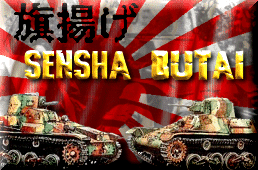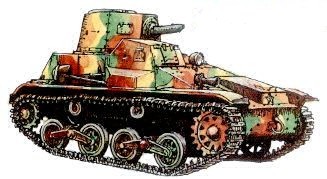Japanese Armoured Units on Timor Island, 1942

Timor Island Campaign, March 1942
On March 20th, the Japanese forces launched an invasion of Timor Island. The Itoh Detachment, the main force of the Timor expedition forces landed on the south end of Timor at mid-night of the 20th. The Itoh Detachment was separated into three groups, Right Attack Group, Centre Attack Group and Left Attack Group. The Right Attack Group consisted of one infantry company, one MG platoon and one infantry gun platoon. The Right Group landed on the east of Mali Cape, advanced north-east and aimed to occupy Usua. The Centre Attack Group consisted of one infantry battalion, one AT company and one mountain gun company. They landed on the east of Mali Cape with the Right Group and advanced north aiming at Koepang. They also planned to despatch a part of the group to reinforce the SNLF paratroops at Penfui Airfield. SNLF paratroopers planned to drop near Babau and occupy the air field. The Left Attack Group is the main body of the Itoh Detachment. They landed on the west of the Mali Cape and advanced on Koepang.
The Left Attack Group broke through a little resistance of the enemy and rushed into Koepang at 19:00 of D-Day. The Centre Atack Group arrived at Koepang on the morning of the next day, and the HQ of the Itoh Detachment was stationed there on the evening of 21st. The occupation of the Penfui Airfield was delayed due to the resistance of the Allied forces. It was occupied on the morning of 22nd.
Meanwhile, the Right Attack Group advanced via Baun and Ukabiti and reached Usua on the evening of 21st. The enemy's resistance during their advance was slight. They occupied a position at Usua. Around 7:00 of the 22nd, the Right Attack Group at Usua was attacked by the approx. one thousand Allied troops. They were Australians who had defended the north of the Koepang erea. They laid siege to the Right Attack Group and intended to break through the Japanese position. The Japanese repulsed the Allied attack, but their casualities were increased and their ammo ran short.

Japanese tankette Type 94
Information about this clash was brought to the HQ of the Itoh Detachment at 10:30. Commander Itoh immediately ordered Murase troops, which were stationed 22 km west of Usua, to join the Right Attack Group. He requested air-support from the IJN and sent a reinforcement to the Right Attack Group from his group. The reinforcement consisted of one infantry battalion, 2 artillery companies and 11 Type 94 Tankettes. It was commanded by Major Hayakawa, commander of 1st Infantry Battalion of 228th Infantry Regiment. The tankettes were of the 38th Division Tankette Company. The commander of the tankette company was 1st Lieutenant Jyuro Atami.
 The Japanese map of Timor Island, 1942
The Japanese map of Timor Island, 1942The map is the courtesy of Akira Takizawa
The Australian troops had broken through the Japanese position at Usua in the evening. The Right Attack Group had suffered heavy damage and was out of ammo, so they couldn't check the Australians. After breaking through the Japanese position, the Australians advanced east. They intended to go to East Timor, which was Portuguese territory and thought of as a neutral zone.
On the morning of the 23rd, they took a rest at 36 km east of Usau and had breakfast. At that time, five Japanese tankettes were coming up to them. At first, Australians thought these tankettes were flying a white flag. However, it was not a white flag but a rising-sun flag. These tankettes were the van of the Hayakawa unit.
Australians prepared AT guns in haste, but the Japanese tankettes rushed into the column of the Australian HQ unit and stopped among them. The Australians could not open fire against these tankettes. If they had fired, they would have hit friendly soldiers. While they were embarrassed with the situation, the Japanese commander of the head tankette raised a hatch and shouted, "Surrender!". Australians unwillingly held up their hands. A Japanese officer required an Australian commander to surrender the entire Australian force. Threatened by the Japanese, an Australian commander accepted it and ordered his troops to surrender. Before long, the main body of the Hayakawa unit followed the tankettes and received the Australian POWs. They were about one thousand men.
During the operation of west Timor, the Itoh Detachment took over the following equipment from the Allied forces:
- 7 Carden Lloyd Armoured Carriers
- 5 Krupp Armoured Cars
- 2 15cm Howitzers
- 8 Mortars
- 2 AT Guns
- 6 37mm AA Guns
- 18 12.7mm AA Guns
- 45 HMGs
- 756 Rifles
The POWs of the Allies were 1,136 men. As for the casualities of the Itoh Detachment, 67 men were killed and 56 men were wounded.
East Timor Island was occupied by the 2nd Battalion of 228th Infantry Regiment. Timor Island was entirely conquered by the Japanese in the middle of April.
Forgotten Campaign: The Dutch East Indies Campaign 1941-1942
Copyright © Akira Takizawa 1999-2000

